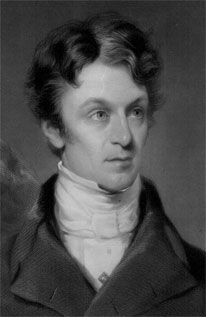| Profile | Major Works | Resources |
James Martineau, 1805-1900.

The English Unitarian theologian and philosopher, who's inclusion on this site is due to his popularization of hedonic philosophy and his coincidental relationships with multiple economists.
Born into a Norwich textile manufacturing family of Huguenot descent, James Martineau was the younger brother of the economist Harriet Martineau (they were the sixth and seventh of a large brood.) Non-conformist (Unitarian) by faith, James was given a thorough, if brief, education, rounded off by two years at the dissenting Bristol school established by the Unitarian minister Lant Carpenter. Exhibiting an early penchant for mathematics, at his father's request, Martineau ended his studies and was apprenticed to a civil engineer in Derby for a year. But the lure of faith and theology kept dogging him, prompting him to abandon his scientific vocation and pursue a calling as a Unitarian minister. To this end, in 1822, Martineau enrolled in Manchester New College, a non-conformist academy, then at York. This turned out to be a strenuous expense, coinciding with an extremely difficult period in his family's fortunes.
After completing his studies in 1827, Martineau spent a year filling in for his sickly old teacher Carpenter at the Bristol School, and was invited to take over the job. But Martineau was eager for pastoral work. He finally found a vacancy in Ireland, and, in 1828, Martineau was ordained and took up duties at the Eustace Street Presbyterian Church in Dublin. In 1832, entering a quarrel over regium domum, Martineau resigned from Dublin, and moved to Liverpool. In 1836, Martineau published his Rationale of Religious Enquiry, raising reason as the ultimate arbiter of religious truth, and setting him on the road to his future explorations on the relationship between religion and human conscience. The book making him a minor public celebrity.
James Martineau was appointed the first Professor of Mental and Moral Philosophy and Political Economy at Manchester New College (MNC) in 1840. In 1853, MNC moved to London. A semi-formal deal was eventually struck with her old rival, University College London (UCL), whereby MNC would concentrate on theology and related topics, while UCL would take care of the secular courses. Unwilling to leave his Liverpool home and pulpit, Martineau spent four years commuting the distance, until finally moving to London in 1857. His course of lectures included Ethics, Philosophy of Religion and, a weaker spot, Logic (assigning Hamilton, Mill, Bain and Aristotle).
In 1858, Edward Taggart, the Unitarian minister of Little Portland Street Chapel, died. Martineau was appointed jointly with jointly with John James Taylor, the principal of MNC, to succeed Taggart in the pulpit. When Taylor died in 1869, Martineau succeeded him both as principal of MNC and sole minister at the chapel.
Philip H. Wicksteed was among Martineau's first students in London and his successor at the Little Portland Street Chapel. W. Stanley Jevons attended Martineau's course at MNC in late 1860, later proving instrumental in familiarizing Jevons with utilitarian philosophy.
|
Major Works of James Martineau
|
|
HET
|
|
Resources on James Martineau
|
All rights reserved, Gonšalo L. Fonseca
